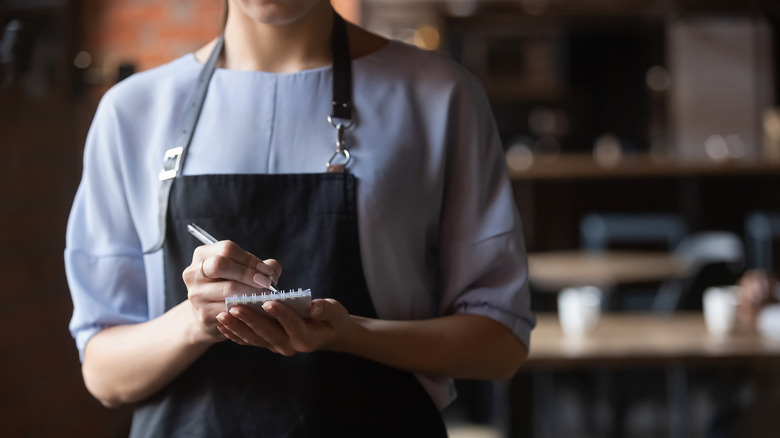How A Lawsuit Over Salt Bae's Miami Restaurant Sparked A Debate About Tipping
So, you managed to snag a seat at that Miami steakhouse where celebrity salt-shaking chef Salt Bae (i.e., Turkish-born butcher turned restaurateur, Nusret Gökçe) charges $120 for a steak with a side of theatrics (via Miami Herald). Your meal is superb; the service: stellar. Just when you think it can't get any better, the bill arrives with this seemingly delightful convenience: an 18% service charge. Sure, it's not up to the level of the over-20% you've been forking over lately as a show of thanks to servers for showing up amid a restaurant labor shortage that's threatened to cripple the industry. But it's certainly respectable. Not to mention, it's a way of avoiding the "how much to tip" debate with your dining companion who's known as the "Rachael Ray of tipping" of your friend group.
There's just one problem. That service charge is going straight to the restaurant, and your server may never see a penny of it – except indirectly as part of their pre-tip wages. That means that if you want to actually tip your server, you'll have to do so separately and on top of that 18% service charge. But who even knows that a "service charge" would ever NOT be intended to compensate servers for their services?
If you find that offensive, you're not alone, which is why 24 servers from Nusr-et Miami sued the restaurant for violating the Federal Fair Labor Standards Act in withholding tips. The servers lost. And so did you.
Welcome to the new tipping debate sparked by the Salt Bae Miami lawsuit
On March 18, 2022, the 11th Circuit Court of Appeals ruled that Salt Bae's Miami steakhouse is legally entitled to keep every penny of the 18% "service charge" that it customarily adds to a diner's food and drink bill, so long as the restaurant is using the money to meet its payroll obligations (via Court Listener), which are considerably smaller than the payroll obligations of employers whose employees are not eligible to receive gratuities (via IRS and The Balance). In other words, despite that restaurant servers may rely upon tips to make up for the lower wage that is legally permitted under the Fair Labor Standards Act, Salt Bae's Miami outpost is permitted to reinvest its 18% service charge into its own business. Despite its characterization as a "service charge," it is not a "tip" for your server.
The 11th Circuit's decision is complicated from both a substantive and a procedural standpoint, but basically, what the Court's decision comes down to is that under U.S. law, a "tip" is that which a customer may pay at their discretion. Since the "service charge" is not discretionary, it is not a tip. What's more, this ruling will apply to restaurants all over Florida, Georgia, and Alabama (via U.S. Courts) should they choose to start charging their own service fees. And it may apply to restaurants throughout the U.S. unless and until the U.S. Supreme Court reverses the Court of Appeals.

